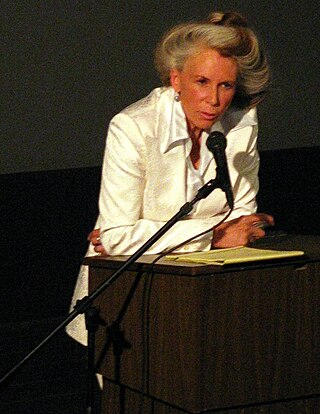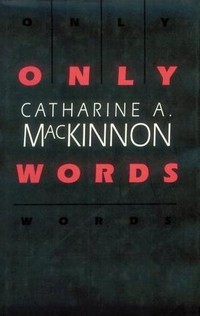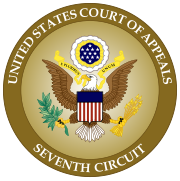
Pornography has existed since the origins of the United States, and has become more readily accessible in the 21st century. Advanced by technological development, it has gone from a hard-to-find "back alley" item, beginning in 1969 with Blue Movie by Andy Warhol, the Golden Age of Porn (1969–1984) and home video, to being more available in the country and later, starting in the 1990s, readily accessible to nearly anyone with a computer or other device connected to the Internet. The U.S. has no current plans to block explicit content from children and adolescents, as many other countries have planned or proceeded to do.

Frank Hoover Easterbrook is an American lawyer and jurist who has served as a United States circuit judge of the U.S. Court of Appeals for the Seventh Circuit since 1985. He was the Seventh Circuit's chief judge from 2006 to 2013.
Sex-positive feminism, also known as pro-sex feminism, sex-radical feminism, or sexually liberal feminism, is a feminist movement centering on the idea that sexual freedom is an essential component of women's freedom. They oppose legal or social efforts to control sexual activities between consenting adults, whether they are initiated by the government, other feminists, opponents of feminism, or any other institution. They embrace sexual minority groups, endorsing the value of coalition-building with marginalized groups. Sex-positive feminism is connected with the sex-positive movement. Sex-positive feminism brings together anti-censorship activists, LGBT activists, feminist scholars, producers of pornography and erotica, among others. Sex-positive feminists believe that prostitution can be a positive experience if workers are treated with respect, and agree that sex work should not be criminalized.

Catharine Alice MacKinnon is an American feminist legal scholar, activist, and author. She is the Elizabeth A. Long Professor of Law at the University of Michigan Law School, where she has been tenured since 1990, and the James Barr Ames Visiting Professor of Law at Harvard Law School. From 2008 to 2012, she was the special gender adviser to the Prosecutor of the International Criminal Court.
R v Glad Day Bookshops Inc, (2004) is a leading Ontario Superior Court of Justice decision on pornography and homosexuality. The court found that a statutory scheme requiring the approval of the Ontario Film Review Board before films can be distributed or shown in Ontario violated the guarantee of freedom of expression in section 2 of the Canadian Charter of Rights and Freedoms.

R v Butler, [1992] 1 S.C.R. 452 is a leading Supreme Court of Canada decision on pornography and state censorship. In this case, the Court had to balance the right to freedom of expression under section 2 of the Canadian Charter of Rights and Freedoms with women's rights. The outcome has been described as a victory for anti-pornography feminism and the Women's Legal Education and Action Fund, but a loss for alternative sexualities.
The Anti-pornography Civil Rights Ordinance is a name for several proposed local ordinances in the United States and that was closely associated with the anti-pornography radical feminists Andrea Dworkin and Catharine A. MacKinnon. It proposed to treat pornography as a violation of women's civil rights and to allow women harmed by pornography to seek damages through lawsuits in civil courts. The approach was distinguished from traditional obscenity law, which attempts to suppress pornography through the use of prior restraint and criminal penalties.
The feminist sex wars, also known as the lesbian sex wars, sex wars or porn wars, are collective debates amongst feminists regarding a number of issues broadly relating to sexuality and sexual activity. Differences of opinion on matters of sexuality deeply polarized the feminist movement, particularly leading feminist thinkers, in the late 1970s and early 1980s and continue to influence debate amongst feminists to this day.
David Frank Hamilton is a senior United States circuit judge of the United States Court of Appeals for the Seventh Circuit. He was previously a United States district judge of the United States District Court for the Southern District of Indiana. On March 17, 2009, he became President Barack Obama's first judicial nominee when he was named for a seat on the Seventh Circuit. He was confirmed by the Senate on November 19, 2009, in a 59–39 vote.

Andrea Rita Dworkin was an American radical feminist writer and activist best known for her analysis of pornography. Her feminist writings, beginning in 1974, span 30 years. They are found in a dozen solo works: nine books of non-fiction, two novels, and a collection of short stories. Another three volumes were co-written or co-edited with US constitutional law professor and feminist activist, Catharine A. MacKinnon.
Feminist views on pornography range from total condemnation of the medium as an inherent form of violence against women to an embracing of some forms as a medium of feminist expression. This debate reflects larger concerns surrounding feminist views on sexuality, and is closely related to those on prostitution, BDSM, and other issues. Pornography has been one of the most divisive issues in feminism, particularly in Anglophone (English-speaking) countries. This division was exemplified in the feminist sex wars of the 1980s, which pitted anti-pornography activists against pro-pornography ones.
An anti-pornography movement in the United States has existed since before the 1969 Supreme Court decision of Stanley v. Georgia, which held that people could view whatever they wished in the privacy of their own homes, by establishing an implied "right to privacy" in U.S. law. This led President Lyndon B. Johnson, with the backing of Congress, to appoint a commission to study pornography. The anti-pornography movement seeks to maintain or restore restrictions and to increase or create restrictions on the production, sale or distribution of pornography.
The Pornography Victims Compensation Act of 1991 was a bill, S. 983, in the U.S. Congress. The sponsor in the Senate was Senator Mitch McConnell with eight cosponsors. A Senate committee held hearings on the bill. The bill was not voted on, did not pass, and did not become law.
Feminists Fighting Pornography was a political activist organization against pornography. It advocated for United States Federal legislation to allow lawsuits against the porn industry by women whose attackers were inspired by pornography. FFP was based in New York, N.Y., was founded in 1983 or 1984, and dissolved in 1997.

American Booksellers Foundation for Free Expression v. Strickland, 560 F.3d 443, is a decision of the Sixth Circuit Court of Appeals involving a constitutional challenge—both facially and as-applied to internet communications—to an Ohio statute prohibiting the dissemination or display to juveniles of certain sexually-explicit materials or performances. The Sixth Circuit panel declined to resolve the constitutional issue but, instead, certified two questions to the Ohio Supreme Court regarding the interpretation of the statute. The Ohio Supreme Court answered both questions affirmatively and placed a narrowing construction on the statute. Since the Ohio Supreme Court's decision, the Sixth Circuit has not reheard the case.
Alexander v. Yale, 631 F.2d 178, was the first use of Title IX of the United States Education Amendments of 1972 in charges of sexual harassment against an educational institution. It further established that sexual harassment of female students could be considered sex discrimination, and was thus illegal.

Only Words is a 1993 book by Catharine MacKinnon. In this work of feminist legal theory, MacKinnon contends that the U.S. legal system has used a First Amendment basis to protect intimidation, subordination, terrorism, and discrimination as enacted through pornography, violating the equal protection guarantee of the Fourteenth Amendment.

Feminism Unmodified: Discourses on Life and Law is a 1987 book by feminist legal scholar Catharine A. MacKinnon. The book is a collection of essays by MacKinnon delivered during the 1980s, in which she makes a radical feminist critique of pornography and liberal feminism.
United States v. Miller, 425 U.S. 435 (1976), was a United States Supreme Court that held that bank records are not subject to protection under the Fourth Amendment to the United States Constitution. The case, along with Smith v. Maryland, established the principle of the third-party doctrine in relation to privacy rights.








